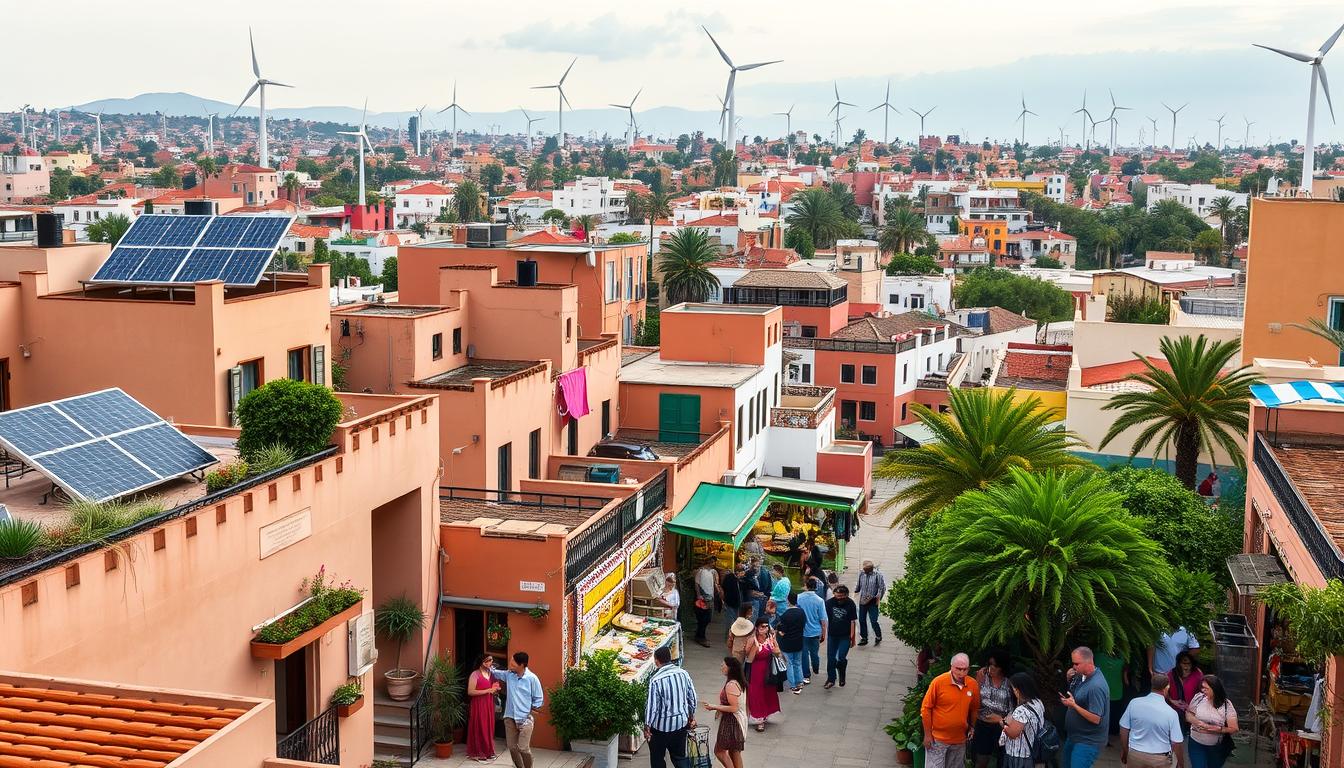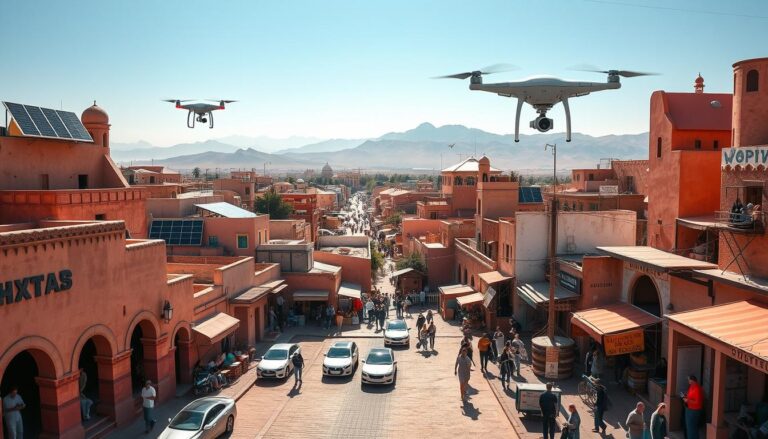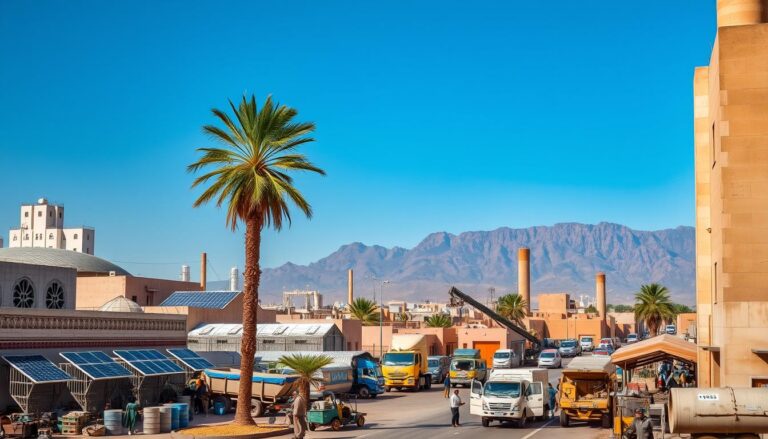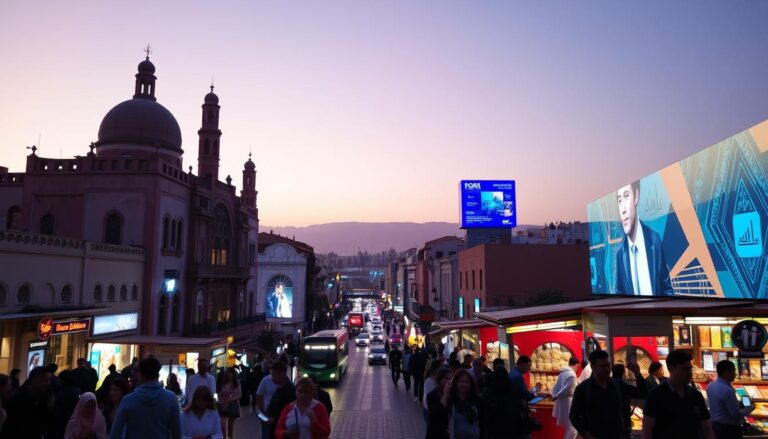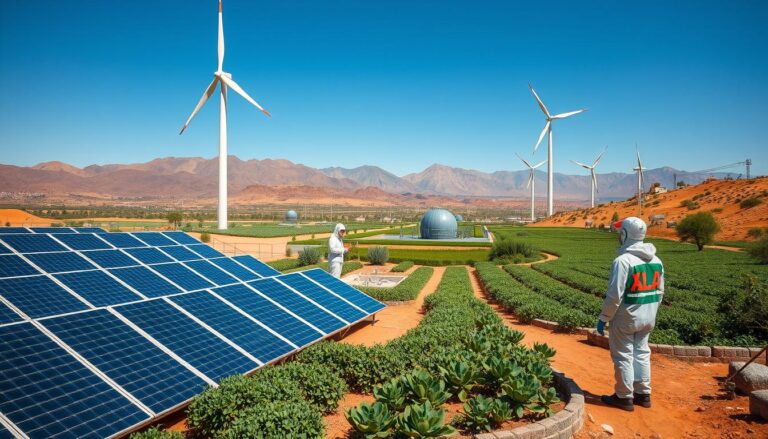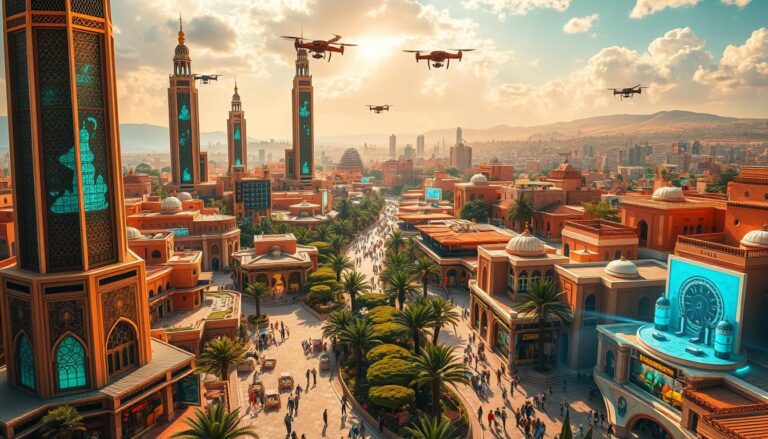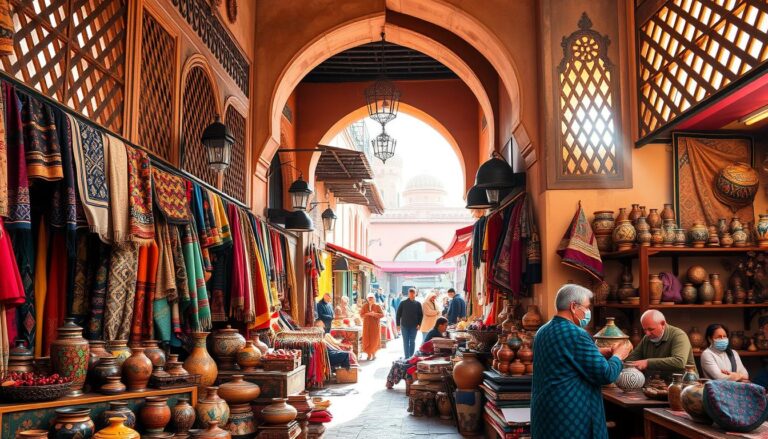What if the next big tech hub isn’t in Silicon Valley, but in North Africa? Morocco is quickly moving forward in science and technology. It’s doing this with big help from the government, which wants to boost scientific research.
Morocco ranks 67th out of 132 economies in the Global Innovation Index (GII) 2022. It’s making big steps in innovation, especially in creative and knowledge outputs. The country shines in areas like labor productivity growth and high-tech manufacturing.
The public sector, mainly universities, hires 58% of researchers. This shows how important they are in Morocco’s tech world. Despite not being a top research priority, Morocco has great human resources and labs. The University of Al-Karaouine, the oldest university in the world, highlights Morocco’s rich academic history.
Morocco plans to double its clean energy research investment over five years. This will go from €40 million in 2012-2017 to €80 million by 2018-2023. This shows Morocco’s commitment to leading in technology trends.
These efforts and reforms are making it easier for Moroccan innovation to grow. They’re setting the stage for long-term technological progress. Want to know more about how Morocco is making these strides? Keep reading to find out about the initiatives, projects, and strategies behind this change.
The Evolution of Research and Development in Morocco
The Moroccan government is working hard to improve research and development. They want to make Morocco a leader in these areas. This goal is part of their innovation policy.
Government Policies and Initiatives
Education and science are key for Morocco’s growth. A big part of the country’s budget goes to these areas. The Five-Year Plan from 2000-2004 helped focus research efforts.
The Ministry of Higher Education and Scientific Research is crucial. It has a plan for scientific research until 2025. Morocco also has trade agreements with over 50 countries, helping with research collaborations.
University Contributions and Achievements
Universities are vital for Morocco’s R&D. They help create new knowledge, which is important for the country’s growth. Moroccan universities are now more focused on research, thanks to partnerships with the private sector.
The Tanger Free Zone is attracting foreign investments. It offers tax breaks and great infrastructure. This helps boost R&D and leads to new discoveries.
Universities are working closely with the government’s goals. They aim to increase the country’s economy and technology. This shows how important university research is for Morocco’s future.
The Impact of Technopolis Projects
Technopolis projects are changing Morocco’s tech scene. They help boost innovation and business growth. A €100 million loan from the European Investment Bank (EIB) in October 2012 supports these efforts. Now, they’re making a big difference across the country.
Technopolis Rabat
Technopolis Rabat is a key player in Morocco’s tech world. The Moroccan king opened it, aiming for high-tech jobs by 2016. Companies like Nemotek and Alcatel have set up shop there, boosting its reputation.
It’s also a place where women in tech shine. Accytime at Technopolis Rabat shows this, with 60% of its team being women.
Technopolis Oujda
Technopolis Oujda is another important project in Morocco’s tech parks. It focuses on CleanTech and off-shoring services. It also has training campuses to improve local skills.
This project aims to create many jobs. It’s a big part of Morocco’s tech scene. The EIB has supported Morocco for 35 years, financing over €4.7 billion. This support has helped projects like Technopolis Oujda.
Technopolis Morocco includes seven tech parks by MEDZ. These parks are in places like Rabat-Salé and Oujda Technopole. They’re key to Morocco’s economic and social growth, focusing on innovation and tech progress.
Morocco’s National Innovation Strategy
The Moroccan Innovation Strategy was launched at the country’s first National Innovation Summit. It aims to make big strides in many areas. This plan helps boost innovation at home, link businesses and government, and find new ways to fund start-ups and big companies.
Morocco is also working to grow its digital economy. This is part of a bigger plan to move forward.
Since then, the startup scene in Morocco has grown a lot. There are now 74 places that help start-ups grow. Technopark, for example, has helped over 1,100 companies since 2001. Most of these places focus on ICT, green tech, and social and solidarity economy.
Banks like Attijariwafa Bank and BMCE Bank of Africa have been big supporters of innovation. They’ve helped a lot over the last five years. The government has also put almost US$65 million into supporting innovation and partnerships between businesses and universities.
In 2011, Morocco wanted to create three innovation cities in Fez, Marrakesh, and Rabat. A fourth was added in Casablanca the next year. These cities aim to connect research with the market, helping to develop skills and talent by 2050.
Universities and start-ups in these cities work together closely. They offer tech and legal help, funding, and business incubators. This shows Morocco’s commitment to advancing technology and building innovative cities.
The digital economy in Morocco is set to grow thanks to these efforts. These plans ensure sustainable growth and a strong base for future innovations. The Moroccan Innovation Strategy is making a big difference, creating a great environment for start-ups and big companies to thrive.
Morocco’s Ranking in the Global Innovation Index
Morocco has made great strides in innovation, moving up to the 66th spot globally. It scored 28.8 out of 100 in the Global Innovation Index (GII) 2024. This shows Morocco’s growing role in global innovation.
It does well in turning investments into real results. Morocco shines more in innovation outputs than inputs.
Performance in Innovation Outputs vs. Inputs
Morocco does better in innovation outputs than inputs. It ranks 70th in knowledge and technology outputs. It also ranks 37th in creative outputs.
However, in inputs, Morocco’s rankings are not as high. It ranks 78th in institutions, 81st in human capital and research, and 88th in infrastructure. This shows Morocco’s strong ability to turn investments into quality innovation outputs.
Comparative Analysis with Regional Economies
- In the Arab world, Morocco ranks third, behind the United Arab Emirates and Saudi Arabia. But it leads the Maghreb region ahead of Tunisia, Algeria, and Mauritania.
- Regionally, in Northern Africa tech and Western Asia, Morocco does well. It excels in knowledge and technology outputs and creative outputs.
- Globally, Morocco, India, China, Iran, the Philippines, and Turkey have seen the biggest improvements over the last decade.
Emergence of Innovation Hubs in Morocco
Morocco’s innovation scene has grown a lot with new tech hubs. These places help teams work together on research and starting new businesses. They also get help from the government, which helps create a culture of innovation.
This culture helps connect research with what the market needs. It aims to make technology solutions that are ready for the market.
Main Hubs and Their Contributions
Moroccan tech incubators are key in pushing innovation and technology in Morocco. Taghazout is ranked third in the world for startup hubs, after Seattle and London. Marrakech has many coworking spaces that help startups and young entrepreneurs.
In Casablanca, La Boutique de Startups helps young Moroccan entrepreneurs for six months. They offer legal advice and mentorship. Google Launchpad Accelerator also started a program in Morocco in September 2017.
Endeavor Morocco, backed by USAID, helps successful startups in Morocco. For example, Linea Luxe, a luxury gifting company, got help from Endeavor Morocco. It’s known in ecommerce in the MENA region. Hmizate, an online deals marketplace, also got support and became popular in Morocco.
The CCE Hub in Marrakech will work with many companies from the Middle East and North Africa soon. It joins a similar hub in Accra, Ghana. These hubs show how Moroccan tech incubators can boost innovation and technology in Morocco.
Advancements in Clean Energy Technology
Morocco is leading in clean energy technology. It has set big goals for clean energy R&D. Right now, 90 percent of its energy comes from imported fossil fuels.
But, Morocco wants to use more renewable energy. It aims for 52 percent of power from renewables by 2030. By 2050, it hopes to reach 80 percent.
Role of the Institute for Research in Solar Energy and New Energies (IRESEN)
The Institute for Research in Solar Energy and New Energies (IRESEN) is key in Morocco’s renewable push. It was set up to help the country switch to cleaner energy. IRESEN works on projects to use more renewable energy.
For example, research at Cadi Ayyad University in Marrakech led to new solar cells. These cells use local, affordable materials. This shows IRESEN’s big impact.
Green Energy Park Initiatives
The Green Energy Park is a big step for Morocco’s clean energy goals. It brings together efforts in clean energy Morocco. It aims to use more renewable resources.
Morocco could make 500 terawatts hours of clean energy every year. This includes 350 terawatt hours from wind and 150 terawatt hours from solar. These plans match Morocco’s 2030 goals and make it a leader in clean energy.
Thanks to investments and partnerships, Morocco is moving towards a green and strong future.
Role of Public and Private Sectors in Innovation
In Morocco, the public and private sectors work together to boost technology and innovation. Their partnership is key to growing and keeping innovation alive in the area.
Government Support for R&D
Morocco is dedicated to supporting research and development (R&D) through many initiatives and funds. The government has put more money into science and technology, helping R&D grow. Universities now have their own money to do research and encourage new ideas.
Public-private partnerships in Morocco are very important. They help the government support R&D and use the private sector’s skills and resources.
Private Sector Investments
The private sector is also encouraged by the government to invest in technology in Morocco. Companies, especially in telecom, have helped a lot with research funding. They are now more involved in the country’s R&D efforts.
This teamwork has led to progress in many areas like green energy, farming, health, cars, and defense. The private sector’s role in sharing technology is also vital. It helps turn research into real-world solutions.
They face challenges like losing talent and cultural gaps between schools and businesses. But, these partnerships create a good space for innovation and growth.
Morocco’s Digital Transformation Efforts
Morocco is leading in digital innovation, thanks to its National Digital Development Strategy for 2020-2025. Digital transformation Morocco aims to make the country one of Africa’s top economies by 2030.
The government has big plans, like E-GOV and DigiTPME. These projects aim to digitize public services and help small businesses. They want to make digital services better and more accessible.
ICT Infrastructure Enhancements
Improving Morocco ICT is crucial for the country’s digital future. It’s about using new tech like AI and IoT. The government is working with the private sector to make this happen.
E-Government Services
Expanding e-government in Morocco is a big goal. It aims to make public services better and more efficient. The plan is to train 100,000 young people in digital skills every year.
Investments in education are also key. Scholarships are given for research in new tech. The goal is to create 130,000 jobs in the digital sector.
These efforts are not just improving Morocco ICT. They’re also making the economy more digital and inclusive. This prepares Morocco for the digital future.
Contribution of Moroccan Startups to the Tech Scene
Moroccan startups are making a big impact on the tech scene. They bring new ideas and fresh ways to do business. The tech scene in Morocco is growing fast, thanks to these startups.
In 2020, Morocco saw a big jump in startup activity, reaching 18.4%. This shows the country’s tech scene is booming. Young Moroccans are also excited about starting their own businesses, with 85% seeing it as a good career choice.
Every year, Morocco gets over 10,000 new engineering graduates. This helps the country’s tech talent pool grow. But, startups still face challenges like finding enough money, dealing with red tape, and finding the right people.
Examples of Moroccan Startups
Here are some Moroccan startups leading the way:
- Chari.co: A B2B e-commerce platform that helps small retailers buy inventory better.
- MyTindy: An online marketplace that showcases local Moroccan artisans and their crafts.
- Glovo Maroc: A fast-growing delivery service that uses tech for local logistics.
Support Networks and Incentives
Morocco’s startup scene gets a lot of help from incubators and accelerators. These places offer mentorship, resources, and chances to meet other entrepreneurs. They are key for startups to grow.
There are also partnerships and funding opportunities, like those from the Abraham Accords with Israel. These help startups grow and work together. Support networks in Morocco are important for tackling problems like finding money and dealing with rules.
To help tech startups in Morocco, it’s important to protect ideas early on. Working with advisors and keeping up with legal changes can also help. With the right steps and support, Morocco can turn startup challenges into big economic wins.
Morocco’s Vision for Sustainable Development Through Tech
Morocco is looking to the future with a big plan for sustainable growth. It wants to use new tech to make a better world. The goal is to grow the economy while taking care of the planet.
Renewable Energy Goals
Morocco has big dreams for renewable energy. It wants to use mostly clean energy by 2030. Right now, 37 percent of its power comes from green sources.
Projects like the Noor Ouarzazate Solar Complex show Morocco’s commitment. The country also wants to invest in green hydrogen. This shows its focus on clean energy.
Sustainable Urban Development Initiatives
Morocco is making six cities smarter by 2026. Casablanca started in 2016, followed by others. These cities will be more efficient and better for people.
These smart cities will improve life for everyone. They will have better transport, energy, and homes. This is all about making cities better for people and the planet.
Nizar Baraka, the Minister of Equipment and Water, has a clear plan. He wants to use Morocco’s resources wisely. This plan involves working together to achieve sustainability.
In short, Morocco is leading the way with its green plans. It’s using tech and smart policies to grow and protect the environment. This is a big step towards a better future.
Prominent Challenges and Future Prospects
Morocco is working hard to become a leader in innovation. But, it faces big challenges that need to be solved. These Morocco tech challenges and barriers to innovation must be overcome to unlock the nation’s full potential.
Current Barriers to Innovation
One big Morocco tech challenge is turning educational research into real-world innovations. Despite strong academic work, the connection between schools and businesses is weak. This makes it hard to move technology from the lab to the market.
Also, not enough local companies invest in research and development. It’s important to encourage them to do so for a strong innovation system.
Another issue is the slow adoption of digital technologies in government. Started in 1998, the goal is to fully digitize public services. But, there’s still a lot to do to meet these goals.
Building digital skills and improving governance are key to solving these problems. Morocco has made progress, but there’s still room for improvement.
Opportunities for Growth
Despite these challenges, Morocco has many growth opportunities. It’s focusing on clean energy, digital transformation, and tech startups. The goal is to get 52 percent of energy from renewables by 2030.
The “Digital Morocco 2025” strategy aims to boost digital transformation. It’s improving infrastructure, promoting digital skills, and encouraging innovation.
Investments in tech parks and innovation hubs are also creating a strong startup scene. Places like the Casablanca Technopark and Rabat Technopolis are helping tech startups grow. The Mohammed VI Tangier Tech City shows Morocco’s aim to be a tech and industrial leader.
Working together, the government, private sector, and international partners are creating training programs and research centers. These focus on engineering, renewable energy, and digital technologies. Despite challenges in economic and intellectual property reforms, Morocco’s commitment to innovation is promising for the future.
Conclusion
Morocco is moving forward in tech innovation, aiming for a future that’s both advanced and sustainable. The country is making big steps with education reforms, tech projects, and national strategies. This is setting Morocco up to lead in tech globally.
The focus on clean energy shows Morocco’s commitment to the environment. They aim to use 52 percent clean energy by 2030. The Global Rural Electrification Program has brought electricity to 99 percent of rural areas. This shows Morocco’s drive for sustainable growth through tech.
Morocco has the right policies, investments, and spirit to grow in tech. The future looks bright as they work to overcome challenges and seize new opportunities. This will help both cities and rural areas, making the economy strong and innovative.
Source Links
- Plans and priorities – Mission Innovation
- Science and technology in Morocco
- Morocco: The Next Industrial and Technological Hub 🇲🇦🇪🇺🇺🇸🇬🇧
- No title found
- Morocco’s Quest for Stronger and Inclusive Growth
- Morocco: EUR 100 million for technology parks
- Day 2 in Morocco: TechWomen Visit Technopolis and the International University of Rabat
- Supporting start-ups Episode 3 – How is the Moroccan innovation ecosystem being built? – Accuracy
- Morocco boosts innovation
- Morocco leads Maghreb countries in the 2024 Global Innovation Index
- Morocco’s Long Road Toward Economic Transformation
- Morocco’s Technology Innovation Centre to open its doors | Invest for Jobs
- How Morocco Has Become A Thriving Creative Hub For Digital Nomads
- Morocco hosts new centre to drive climate innovation across the region
- Morocco: New Prospects for Clean Energy Development
- Four Reasons Why Morocco Is Becoming a Renewable Energy Powerhouse
- Just Energy Transitions? Lessons From Oman and Morocco
- Morocco: The Impact of the Digitization of Public Services
- Digital Transformation Center Morocco | BMZ Digital.Global
- Digital Morocco 2030: the national digital transformation strategy
- Morocco’s Innovation Ecosystem: Breaking Silos, Building Collaboration – Startup Nation Central
- The Rise of Tech Startups in Morocco: Why a Strong Intellectual Property Strategy is Essential? – H&H IP LAW
- Startups : Morocco behind the leaders in Africa
- Morocco’s Long Road Toward Economic Transformation
- Unleashing Morocco’s Potential: The Blue Economy And Green Hydrogen – OpEd
- Morocco: Maximizing Economic Momentum and IP Innovation – SABA IP – Intellectual Property in the Middle East and Africa
- New technologies strengthen Morocco’s ICT sector – Africa 2020 – Oxford Business Group

The Editorial Team is a passionate group of Morocco enthusiasts dedicated to sharing the beauty, culture, and wonders of this captivating country. With diverse backgrounds and a deep love for travel, we strive to bring you engaging and informative content that inspires your Moroccan adventures. From uncovering hidden gems and sharing local insights to exploring mouthwatering cuisine and showcasing the vibrant lifestyle, our team is committed to providing you with valuable resources and exciting stories that enhance your exploration of Morocco. Join us on this journey as we celebrate the rich heritage and unforgettable experiences that make Morocco truly special.

